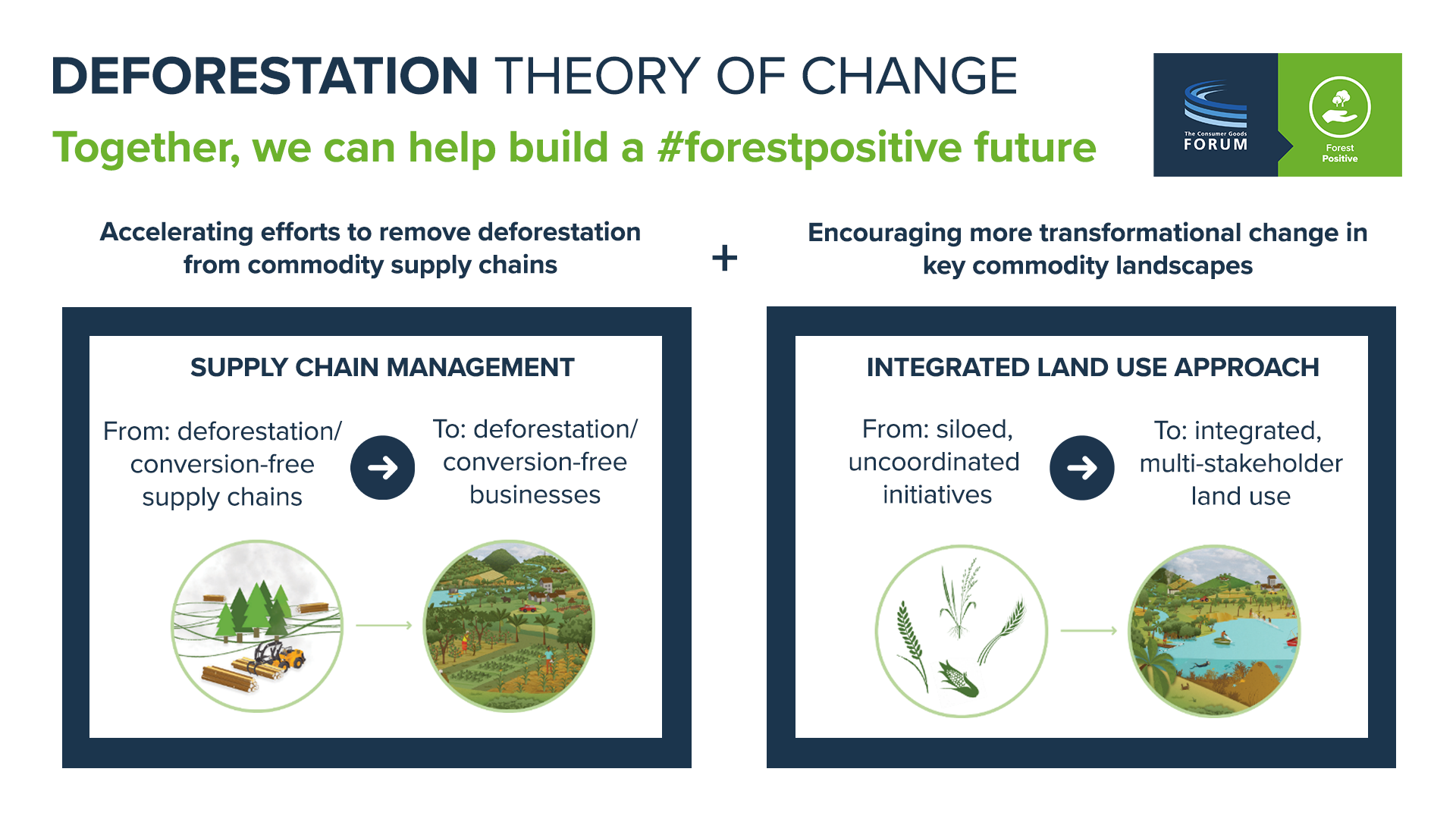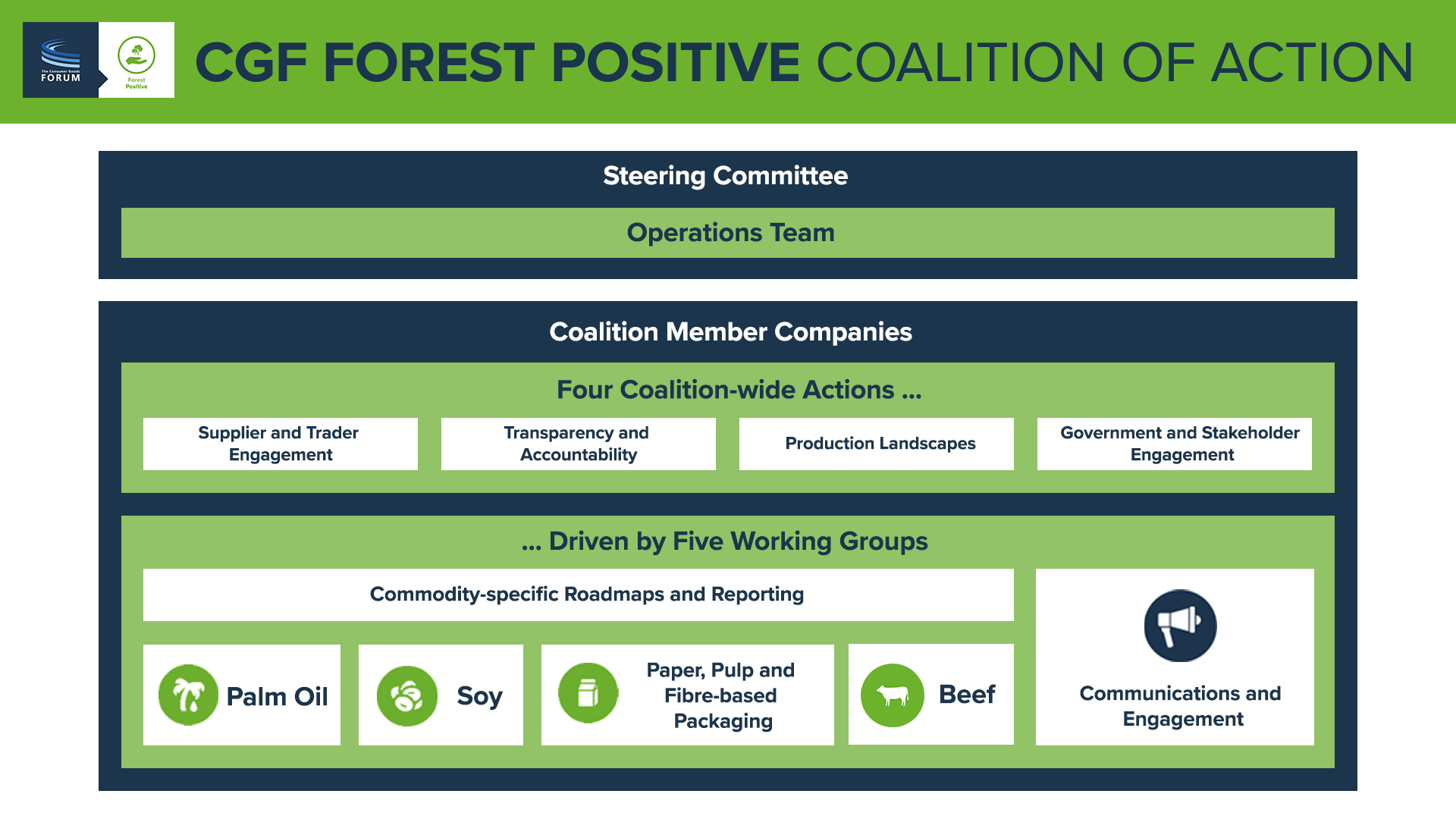The Consumer Goods Forum’s (CGF) Forest Positive Coalition brings together 18 companies, retailers and manufacturers, all committed to accelerate progress and transformation towards a forest positive future. At Proforest, we’ve been pleased to be part of this journey, supporting Coalition members in the development of the Coalition’s Commodity Roadmaps, and the strategic frameworks that outline how members will act to fulfil the Coalition’s Theory of Change.
The Forest Positive Theory of Change identifies that while individual companies can make progress towards eliminating deforestation, collective action is needed for transformation to a forest positive outcome. It recognises the complex interplay of environmental, social and economic factors. It challenges companies to look beyond individual volumes, to think about how they can collectively support sector-wide transformation through engaging with the suppliers they buy from and in the landscapes where the commodities they use are produced.
The Forest Positive Commodity Roadmaps acknowledge this new approach and that it requires members to take a more action-oriented dynamic towards transformation, rather than solely preventative measures. With published commitments, individual and collective actions, and key performance indicators (KPIs) for the group that individual companies will report against, the Commodity Roadmaps also move the industry towards greater transparency and accountability.
Proforest has been supporting the CGF since October 2019, facilitating the process to build on the agreed Theory of Change and to collectively develop the action-oriented Roadmaps. Informed by our work on the ground with suppliers and producers, Proforest is able to provide technical expertise and guidance for both retailers and manufacturers to understand the key challenges and opportunities that have underpinned the development of Roadmaps.
Focusing on three commodities — palm oil, soy, and paper, pulp and fibre-based packaging — we have supported Coalition members in their journeys to develop the individual Roadmaps. We have identified three key learnings from across the consultation and collaboration process for the new Roadmaps.
Multiple perspectives are needed to achieve a single vision
We have a fixed goal – reaching a forest positive future – and a single Theory of Change that guides how we will get there. However, knowing collective action is the key to success, we needed to foster an understanding of the different requirements to reach this goal between manufacturers and retailers, through a process of experience-sharing and learning. Coalition members need both perspectives to align on common goals and to drive change from their position in the supply chain.
For example, Coalition members have been working together to agree and define minimum requirements for effective and credible deforestation monitoring that they and their suppliers can use. While some retailer sand manufacturers have extensive experience working with monitoring providers, this is something new for others. Active discussions with all Coalition members, including manufacturers, have helped retailers to understand how they can collaborate to drive progress in this area from their position in the supply chain.
Knowledge sharing can accelerate the process
An early part of the development process for the Roadmaps was establishing four Coalition-wide Actions, which guide the approach of the Coalition across its Working Groups. These actions are on trader and supplier engagement, transparency and accountability, production landscapes, and government and stakeholder engagement. Having strategic goals at the Working Group level, sitting across all commodities, drove the process of knowledge sharing among the broadest range of experience and expertise, and enabled us to more quickly adapt processes and approaches.
It was also really important to get input from external stakeholders, including both civil society organisations and other supply chain companies who are not part of the Coalition. We share draft versions of each Roadmap before finalising them and have made significant improvements to them based on the feedback we received from environmental and social NGOs, industry associations and other companies. This engagement also provided an opportunity to begin a dialogue that will be continued through regular stakeholder meetings and Evergreen, which CGF has established to provide a place to centralise dialogue with the Coalition’s stakeholders online.
Additionally, through the Coalition-wide Action on supplier and trader engagement, members from across the Commodity Working Groups have come together to align on the common principles of the Coalition’s ask for upstream suppliers and traders to adopt forest positive business practices. Over the coming months we will be working with suppliers to share, discuss and support operationalising this ask, working through the individual Commodity Working Groups. While the ask is tailored to each commodity’s context, having an overarching cross-commodity position is key to drive progress towards mainstreaming forest positive sourcing across the sectors and across production landscapes, to achieve greater transformation.
A map, not a destination
From the start, it was clear that this was a process of transformation that would become more developed as companies became more actively engaged in the supply chain and in the landscapes they operate in. We therefore needed to create an adaptive approach that recognised the variations in commodities, as palm oil, soy, and paper, pulp and fibre-based packaging are at differing levels of maturity in the process towards responsible production and sourcing.
The Theory of Change remains our north star, but the goals are designed to be updated as Coalition members make progress and reach key milestones, to ensure we keep reaching for the best solution for people and planet. This more dynamic approach to KPIs also provides regular opportunities for Coalition members to report back, learn from each other, share experiences and course correct, both as a collective and as individual companies.
The Forest Positive Commodity Roadmaps have built on the work already done by Coalition members to chart what needs to happen next, and gives a clear direction for the next stage of the journey to implement these action plans. It is a complex landscape of environmental, economic and social issues, but the Roadmaps will be instrumental in reaching the positive outcomes we are all working towards.


